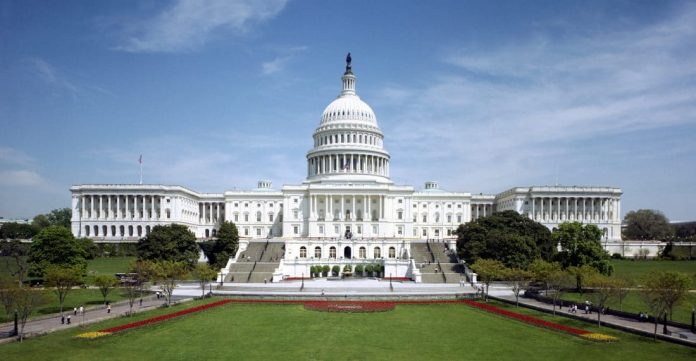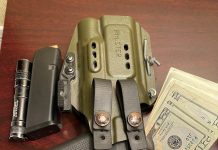
News Flash: Transferring a firearm to someone you know, or have reason to reasonably suspect, is a prohibited person is illegal. You cannot do it anymore than I, as an FFL, can complete a transfer I know or reasonably suspect is illegal even though the FBI gave me a green light ‘Proceed’ in NICS.
It is a subjective rule, one that requires judgement and a decision that may be sustained or overturned in a court, but it is one designed to protect and empower you as a transferor and place liability on you as the transferor to not deliberately arm a prohibited individual.
H.R. 8: Bipartisan Background Check Act of 2021
A BILL
To require a background check for every firearm sale.
Short title
This Act may be cited as the Bipartisan Background Checks Act of 2021
.
Purpose
The purpose of this Act is to utilize the current background checks process in the United States to ensure individuals prohibited from gun possession are not able to obtain firearms.3.
Firearms transfers
(a) In general
Section 922 of title 18, United States Code, is amended by adding at the end the following:
(aa)
(1) (A) It shall be unlawful for any person who is not a licensed importer, licensed manufacturer, or licensed dealer to transfer a firearm to any other person who is not so licensed, unless a licensed importer, licensed manufacturer, or licensed dealer has first taken possession of the firearm for the purpose of complying with subsection (t).
(B) Upon taking possession of a firearm under subparagraph (A), a licensee shall comply with all requirements of this chapter as if the licensee were transferring the firearm from the inventory of the licensee to the unlicensed transferee.
(C) If a transfer of a firearm described in subparagraph (A) will not be completed for any reason after a licensee takes possession of the firearm (including because the transfer of the firearm to, or receipt of the firearm by, the transferee would violate this chapter), the return of the firearm to the transferor by the licensee shall not constitute the transfer of a firearm for purposes of this chapter.
(2) Paragraph (1) shall not apply to— (A) a law enforcement agency or any law enforcement officer, armed private security professional, or member of the armed forces, to the extent the officer, professional, or member is acting within the course and scope of employment and official duties;
(B) a transfer that is a loan or bona fide gift between spouses, between domestic partners, between parents and their children, including step-parents and their step-children, between siblings, between aunts or uncles and their nieces or nephews, or between grandparents and their grandchildren, if the transferor has no reason to believe that the transferee will use or intends to use the firearm in a crime or is prohibited from possessing firearms under State or Federal law;
(C) a transfer to an executor, administrator, trustee, or personal representative of an estate or a trust that occurs by operation of law upon the death of another person;
(D) a temporary transfer that is necessary to prevent imminent death or great bodily harm, including harm to self, family, household members, or others, if the possession by the transferee lasts only as long as immediately necessary to prevent the imminent death or great bodily harm, including the harm of domestic violence, dating partner violence, sexual assault, stalking, and domestic abuse;
(E) a transfer that is approved by the Attorney General under section 5812 of the Internal Revenue Code of 1986; or
(F) a temporary transfer if the transferor has no reason to believe that the transferee will use or intends to use the firearm in a crime or is prohibited from possessing firearms under State or Federal law, and the transfer takes place and the transferee’s possession of the firearm is exclusively—
(i) at a shooting range or in a shooting gallery or other area designated for the purpose of target shooting;
(ii) while reasonably necessary for the purposes of hunting, trapping, or fishing, if the transferor—
(I) has no reason to believe that the transferee intends to use the firearm in a place where it is illegal; and
(II) has reason to believe that the transferee will comply with all licensing and permit requirements for such hunting, trapping, or fishing; or
(iii) while in the presence of the transferor.
(3) It shall be unlawful for a licensed importer, licensed manufacturer, or licensed dealer to transfer possession of, or title to, a firearm to another person who is not so licensed unless the importer, manufacturer, or dealer has provided such other person with a notice of the prohibition under paragraph (1), and such other person has certified that such other person has been provided with this notice on a form prescribed by the Attorney General.
(b) Amendment to section 924(a)
Section 924(a)(5) of title 18, United States Code, is amended by striking (s) or (t)
and inserting (s), (t), or (aa)
.
(c) Rules of interpretation
Nothing in this Act, or any amendment made by this Act, shall be construed to—(1)
authorize the establishment, directly or indirectly, of a national firearms registry; or(2)
interfere with the authority of a State, under section 927 of title 18, United States Code, to enact a law on the same subject matter as this Act.
(d) Effective date
The amendment made by subsections (a) and (b) shall take effect 180 days after the date of enactment of this Act.
Effect in Practice
“The purpose of this Act is to utilize the current background checks process in the United States to ensure individuals prohibited from gun possession are not able to obtain firearms.“
This act will not achieve its purpose and cannot be expected to do so in any reasonable fashion. It requires both 100% compliance from the United States population and 100% accuracy from the FBI’s NICS system which is more burdened now than it has ever been and is producing slow results and delays.
This, combined with efforts against the so called “Charleston Loophole,” will create a defacto dead zone of gun prohibitions and denied purchases, mostly because the system cannot handle the volume. Many background checks go unresolved and simply timeout in NICS, far more receive a prompt decision or a decision prior to the Brady Transfer Date, but we cannot allow the sacrifice of a minority of people’s rights to be held in perpetual limbo just because the system ‘mostly’ works and we could theoretically prevent transfers that shouldn’t occur.
In essence, H.R. 8 is stating that we should background check every firearm transfer mandatorily (which is an impossibility) because some private transfers are to prohibited individuals. They would like to combine that with removing the Brady Transfer Date so that transfers only occur after a ‘completed’ background check in a system that does not complete all background checks. There is no reasonable enforcement mechanism that will increase the efficacy over current standings, you can already voluntarily seek out a background check transfer at an FFL if you want to for sale of a firearm, or certain states have a lawful listed preemption of the requirement based on a license or certification.
In short, the ability of someone to use NICS to check a private sale already exists on a voluntary basis. Making it legally compulsory will not make that access easier or more convenient, which is why many people don’t use it right now. There is no reasonable way to know, from a law enforcement perspective, if a check took place prior to a crime. Nor is it overly relevant to the investigation of the current crime whether or not a background check took place, whether or not the alleged perpetrator was a prohibited or non-prohibited individual is just and additional charge to the crime that took place now is being investigated now.
The source of the gun can only, possibly, result in legal action against the transferor. The transferor who is already liable if law enforcement can reasonably prove the supply of the weapon was deliberate, either for the illegal act or that the transferor knew the person was prohibited.
In short, what H.R. 8 seeks to enforce is already enforceable for the actual crimes it is seeking to prosecute. It has no realistic hope of ‘ensuring’ that individuals prohibited from gun possession are not able to obtain firearms. It does not prevent theft, nor does it prevent someone ignoring the law for any reason they so choose, it can only prosecute violations if/when found and if convenient for the prosecuting body to take to court in the first place.
In short(er) H.R 8 is useless mandated bureaucracy thinly disguised as a safety rule that has no chance of working effectively. It is there of no value to make into law unless the goal, which of course it is, is too suppress the second amendment through the pressures of inconvenience and cost.



